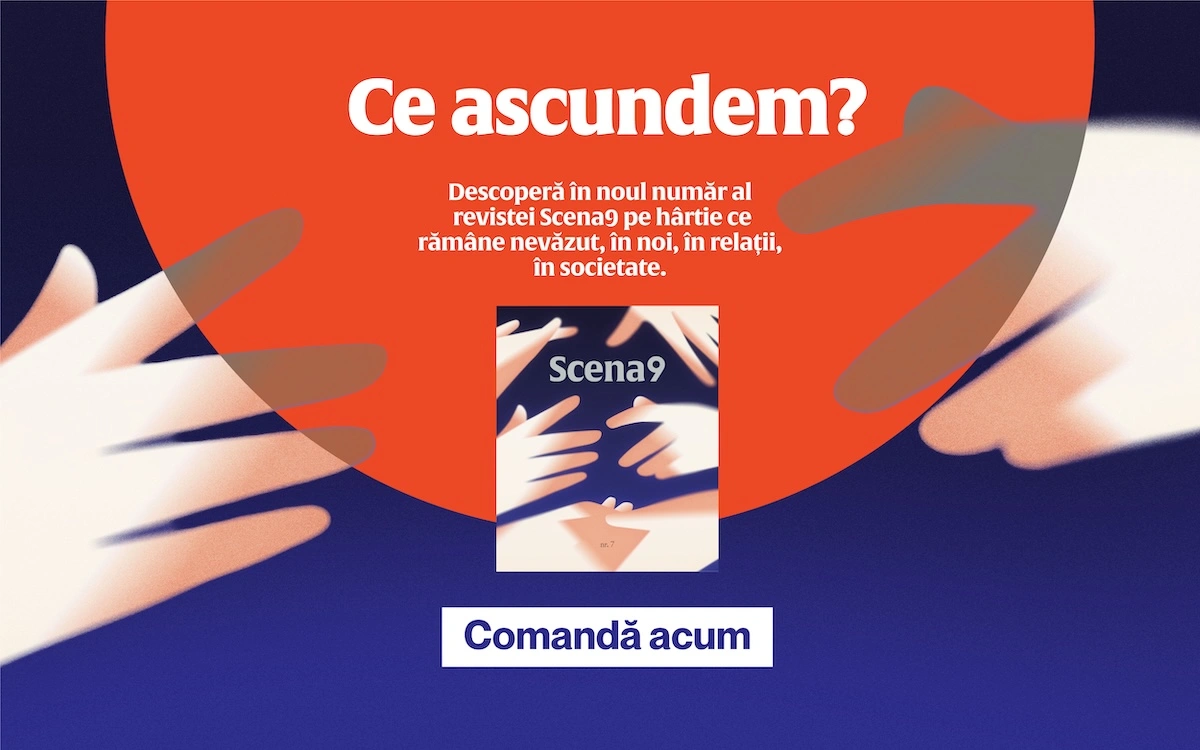When I look at Poto, I don’t see Iancu from Nuntă mută (Mute Wedding), Radu from Dincolo de calea ferată (From Beyond the Railroad), Miron Cozma from Capete înfierbântate (Hot Heads), nor Corneluș from Tipografic. Majuscul (Typographic. Capital Letters). I see a friend, a kind man with an incredible energy, a man who brightens your day. A punk with a heart of gold. I met him three years ago, at noon, in a bar in Bucharest. He wore short pants, and a kaki vest over a T-shirt. He was as slender as the bike he was leaning against and he had a bratty smile.
I’ve always envied how easy it was for him to have a great social life, and the way he makes people laugh and feel good, by giving them a show. I’ve envied that voice that can seduce a rock and how serious he takes his acting, without alluding that he’s important or that he may have personal turmoil. If he does have any turmoil, he uses his work to push through, and sometimes, he blows off steam by getting drunk, becoming a showman with a Transylvanian accent, buying you a drink, and kissing you excessively on the top of your head while telling you Man, you are my friend!
Even though he seems to be an open book, he doesn’t wear his heart out on his sleeve. He has protected himself with the shield of a person who found his validation and who has things to do. He searches to find the balance around his work and leaves no room for drama. This is what helped him survive as an independent actor, in a scene that is dominated by uncertainty; this is what helped him explore and grow. I have tried to find out a few things about him as a person, and to figure out what pushes him to always fascinate his audience.
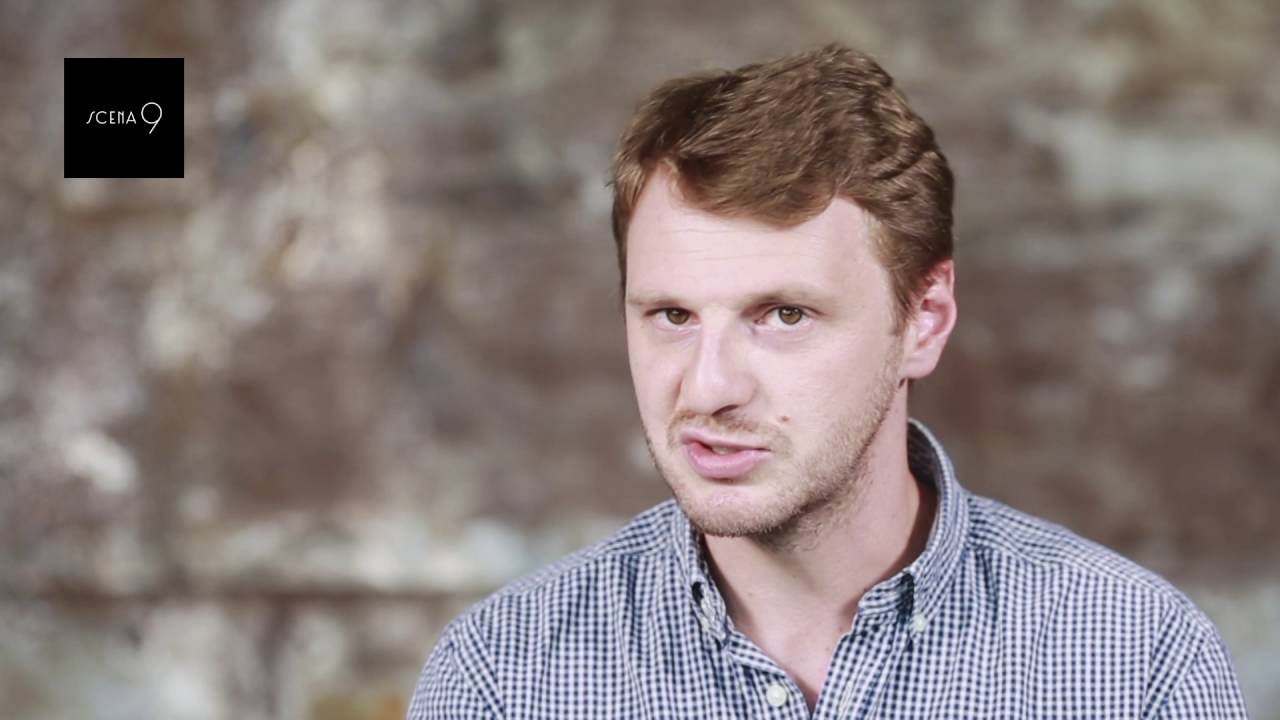
Tales from the School Age
Alexandru Potocean was born in 1984 in the city of Caransebeș, Caraș-Severin County. He lived with his parents and his paternal grandparents until 1988, when he and his parents moved to Timișoara. Until around high school, he did his best to avoid school; he was annoyed that everyone was pestering him about studying. He was part of the middle class, he says, and both his mother, a biology teacher and his father, an engineer, “had carried with them the stigma of the intellectuals defeated by the system”. They put too much stress on information, after it became free in the ‘90s – “theater, film, literature, all of these were pushed on me. And I wasn’t a good student. I liked to play with rocks better”.
He felt most free in Petrila, the mining city in Valea Jiului, where he used to go on vacations and still does once a year, to his grandparents. It was a place free of boundaries, where there was always something to discover. A rural life, in an industrial setting, next to Jiu and past the railroad that was used to transport coals. It was a very “soothing” environment, where he used to tear his clothes off, smear oil on himself from all those abandoned machines that were there around the lay-offs; where he used to jump off the train platform that went through the garden of the hillbillies and where he and the boys used to bribe the TAF drivers to use their machines to make a dam for them to bathe.
But even there, on vacations, the order was as such: first you read, then you’re allowed to be a savage. And he didn’t understand why. It was hot, he wanted to go to bathe, but first he had to sit on a little chair and read, while the carpets would get washed. “Petre Dulfu’s Aventurile lui Păcală (Adventures of Păcală). Good Lord, that book used to drive me crazy. I didn’t get what the deal was with that idiot; he slaughtered the goats and he put one belly up on its back. What is up with these atrocities, I would think to myself. This was one area where the adults in my family and myself have always butted heads. What I say in Mihaela Michailov’s play, Amintiri din epoca de școală (Tales from the School Age) is very true”.
In Timișoara, he was always outside, playing. He watched action flicks on VHS tapes with the boys, and they copied the scenes. They used to shoot themselves with tubes just like they saw in Comando (1985), break their bikes recreating scenes from Mad Max (1979) and they used to fight with their feet up in the air just like Van Damme. When he was alone with himself, he used to come up with faster ways to do his homework, just so that it was done and that he could leave the house. “I just couldn’t learn what they asked of me in school. I knew the subject, but I could only write three sentences about it, why did I have to put out three pages of it? I lost track of many things and both my parents and the teachers would nag me: Do it, why won’t you do it? And I would say I don’t get it, I’m an idiot, I’m stupid, fuck off, and leave me alone!”
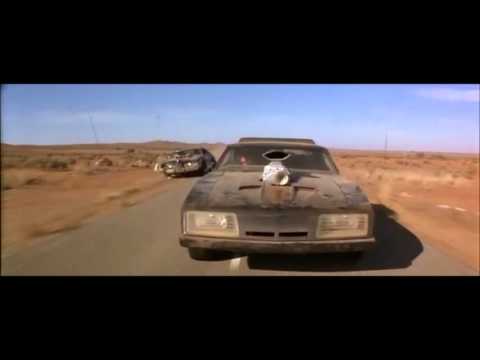
His father, the engineer, nudged him towards sciences, but Poto didn’t like math and he would always feel some sort of pressure and a blockage coming from him. “He didn’t have a scholarly tact, he would explain things to me in a matter that I just wouldn’t understand”, which often lead to clashes between the two. His father had also been a volleyball player at Poli Timișoara, and he sent Poto out to play. “I didn’t have any talent with the ball, but I could have gone way up to the top of the Gărâna hills jumping like a frog. The discipline itself is pure mathematics. And there’s one more thing, I just don’t have a competitive bone in my body. And my father wanted this from me. If I lost at something, be it at throwing rocks at bottles or at volleyball, I didn’t even flinch. What did I lose? My life? My self-confidence? It’s not like I had very much of that to begin with. Once, I got a diploma for the most Tenacious Player. I didn’t even have any idea what that meant, so I went and asked my father. He said: That’s someone who fights for each point.” He bursts into laughter.
On the other hand, his teacher mother would see things differently and she didn’t put as much pressure on him as his father did. It was with her, in the 6th grade, that he saw the first movie that ever spoke to him. The Field (1990) was the story of an Irish man who was fighting for a piece of land during rough times. “I realized that I could understand something else. I always come back to that movie, as the movie that opened me up to something else rather than fighting and cars”. He understood that each movie had a theme, he understood the word context and the main character’s struggle. It was the same with Forrest Gump (1994). “An ample and very emotional movie. I did and still do get very emotional when I watch it. I cry at movies. I understand that that person has a problem and I imagine how hard it would be for me to have it”. It was his mother that would take him to the theater and it was also her that asked him after a show in Timișoara if he would like to be an actor. “I think I said yes, because I thought it as cool, but I had no drive back then”.
In the 7th grade, Alex made a journey to the center of the Earth and it was then that he discovered that reading is cool. “I used to see my folks read all the time and I would ask myself how these people could read so fast. Don’t they get bored? I used to get bored by reading from a schoolbook. I was always thinking Come on! and I couldn’t even read one page, I would get so terribly bored”. But one time, after he got sick bathing in a pool in bad weather with his punks, he got bed-bound with fever, and was attracted by the cover of the Jules Verne book that he had in his library. So he started reading it. “Wow, can you imagine? Some people went inside the Earth, in Iceland, because they heard of a cave there. So they got to the center of the Earth, where they found another planet. What the fuck?! I knew that the core of our planet was made of lava. It couldn’t have been an ocean?! Wow, they found there some ancient vegetation, prehistoric animals, a whole lost world. Then, they traveled beneath the ocean, beneath Europe and they ended up in Italy. Is this highway even real? Jules Verne was the shit. And then I realized that I had read a book! I realized that I understood things”.
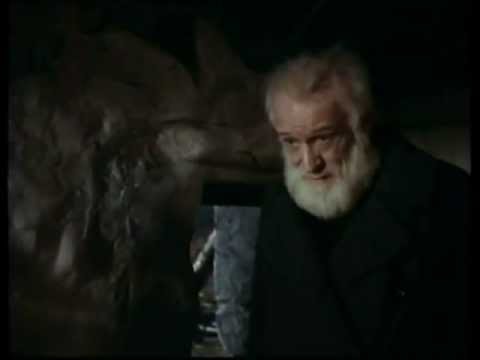
Barrymore and Heavenly Hell
He started reading more, especially around the end of the 8th grade. Even though he was certain that he wouldn’t go to high school, due to the low performance of his previous years, he did make it to high school, Literary Studies. In the 9th grade, Radu Iacoban and Ioana Barbu, two 11th grade students with whom he now often shares a stage in Bucharest, came to him to recruit fresh meat for the high school’s theater company. They said “All you need to do is take with you a book written in English, come after class and go up on stage. All you need to do is read”.
A year prior to that, Alex had been with his mother to a play that had stirred him. Barrymore, directed by Gelu Colgeag, with Ștefan Iordache. “I liked that thing where you were in the center of attention, but you had a job to do. I understood the story, with that Barrymore dude, who was an actor with an issue and there was some pain there. I had seen some shows before, but that was the first one that had touched me. I thought it was such a big deal, all those audience members were sitting still in their chairs. It was nice, it smelled nice, and it was peaceful and quiet. Even now, when I go to plays, even though I get horribly bored, I like to sit in the darkness, feeling small. I feed protected, and it’s great. I think that it was that play that influenced me to join the theater company in high school”.
Poto has always felt shame and he believes that he’ll be stuck with this feeling all his life. He doesn’t really know why that is. It may be because he has tried all throughout his childhood to take into consideration other people’s requests, even though it wasn’t what he wanted. He feels that his cover is going to get blown, that he’s stupid, that he doesn’t belong there, and that people make an effort when they’re watching him on stage. He feels that they are always actors who are more suitable for the roles that he’s playing. That’s what he liked about Ștefan Iordache, the fact that he didn’t have that shame with him, that he made everything flow so naturally, “with such ease. He would stop you in your tracks, take you with him, and you were always paying attention”.
He made it to the high school theater company, because he had a good, deep voice. During high school, he acted in four plays. The first role was in Black Comedy, “where everything was happening backwards. When there wasn’t any light on the stage, people would react normally. When the lights would go on, there was a power outage. I played a character called Harold, who was gay. I thought him out to be very much of a drag queen, I was quite pathetic, but apparently funny. The LGBT culture hadn’t earned the territory and the respect it has now and back then it was a laughing matter”. In the 11th grade he did the coolest play in high school, No Exit, by Sartre, directed by Radu Iacoban, who was already a student in Cluj.
“It was a turning point for us. We were learning about existentialism, we would get informed based on the context. We wore gauzes, sheets, we were ancient mummies who would state things and had authority. It wasn’t that adolescent show-putting nonsense”. He went to Arad with the play, for a festival, and he brought home the award for best actor. “You can imagine I was very proud. It was my first award”.
Also, once he was in the theater company, he met other like-minded people. To his classmates he was shy, he didn’t understand their problems. They seemed to belong to another world than he did, a world of status, fancy cars, and Avon products. He broke up with his punks when he went to high school. “We used to be punks. I remember the moment I showed them that I had an ID card. I was so proud and said Look, I have an ID card! And they said Wow, now that you have an ID card, you can go to jail and they can fuck you up the ass. It was then that I realized they were too stupid”. With his theater colleagues, they used to talk about books, movies, and music. “I liked that the questions I would ask myself about things, someone else would ask themselves, too”. They were listening to metal music, they would buy bootleg tapes and somber T-shirts from Bestial Records, out of a garage. Their band was called Heavenly Hell and it was coordinated by an English teacher who used to listen to classical rock. Besides, their plays were in English, which helped him master the language and prepare him for the foreign films he would later be in.
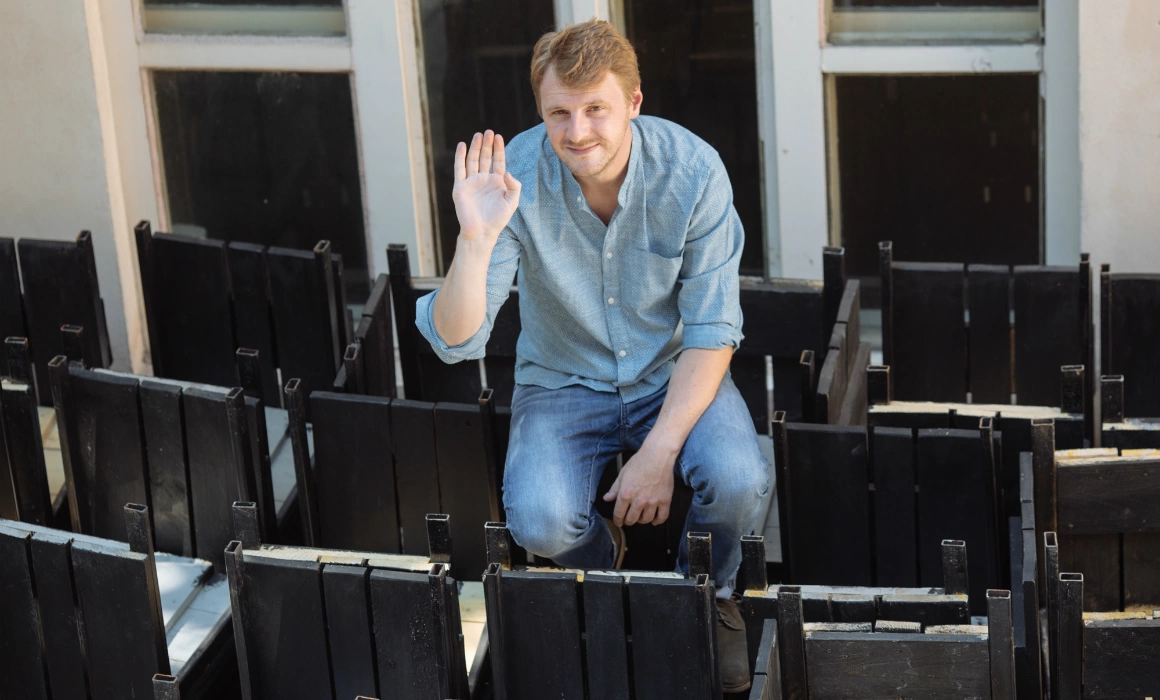
It was in that environment that he felt validated for the first time. People were finally telling him that he was doing well. “It wasn’t like the volleyball situation where people would be Dude, try to pass the ball to us, so we can play. They would say, Dude, it’s very good. I used to joke, they used to laugh. You’re not an artist because you think you’re an artist, you are an artist because other people say that what you’re doing is OK. Talent is relative. Talent manifests itself through the determination to keep doing that thing you’re doing. Dude, learn the lines! Everything else is just feedback”.
This positive feedback, the people he worked with in high school, along with the award he got in Arad, compelled him to study theater in Bucharest. He had heard that it was a tough exam and that it was good to get tutored by someone who teaches there. So, in the 11th grade, he arrived on Râul Doamnei Street, where I currently live, to learn from the actor Constantin Florescu. They became friends, and he used to take him out for beers, introduced him to actors and was trying hard to stop him from feeling shame. “I was extremely sensitive, I thought that everything I did was bad and that I would embarrass myself. And he said that he wouldn’t laugh at me, that he wouldn’t tell me I was stupid, that he would only tell me what cannot work. And he let me come up with my own suggestions, which was very important to me. I would read and come up with things and that’s what he was interested in, not to tell me to do something”.
He received another important lesson, which was to always decline what he didn’t like. “It was a terrible annoyance to accept something you think is idiotic. I used to do that, because I didn’t have a choice. And then I learnt to say no, especially in theater. Unfortunately, people take it the wrong way, they don’t understand”.
The UNATC admission process lasted for a week and it was filled with workshops by future teachers. “This was and still is very important. In one week, you get to know people much better than you would after an exam. One can be very talented, but highly undisciplined and this is a place where discipline matters. This is what the school taught us, the discipline. You cannot learn talent and willpower. If you’re not driven to do it, it won’t work”.
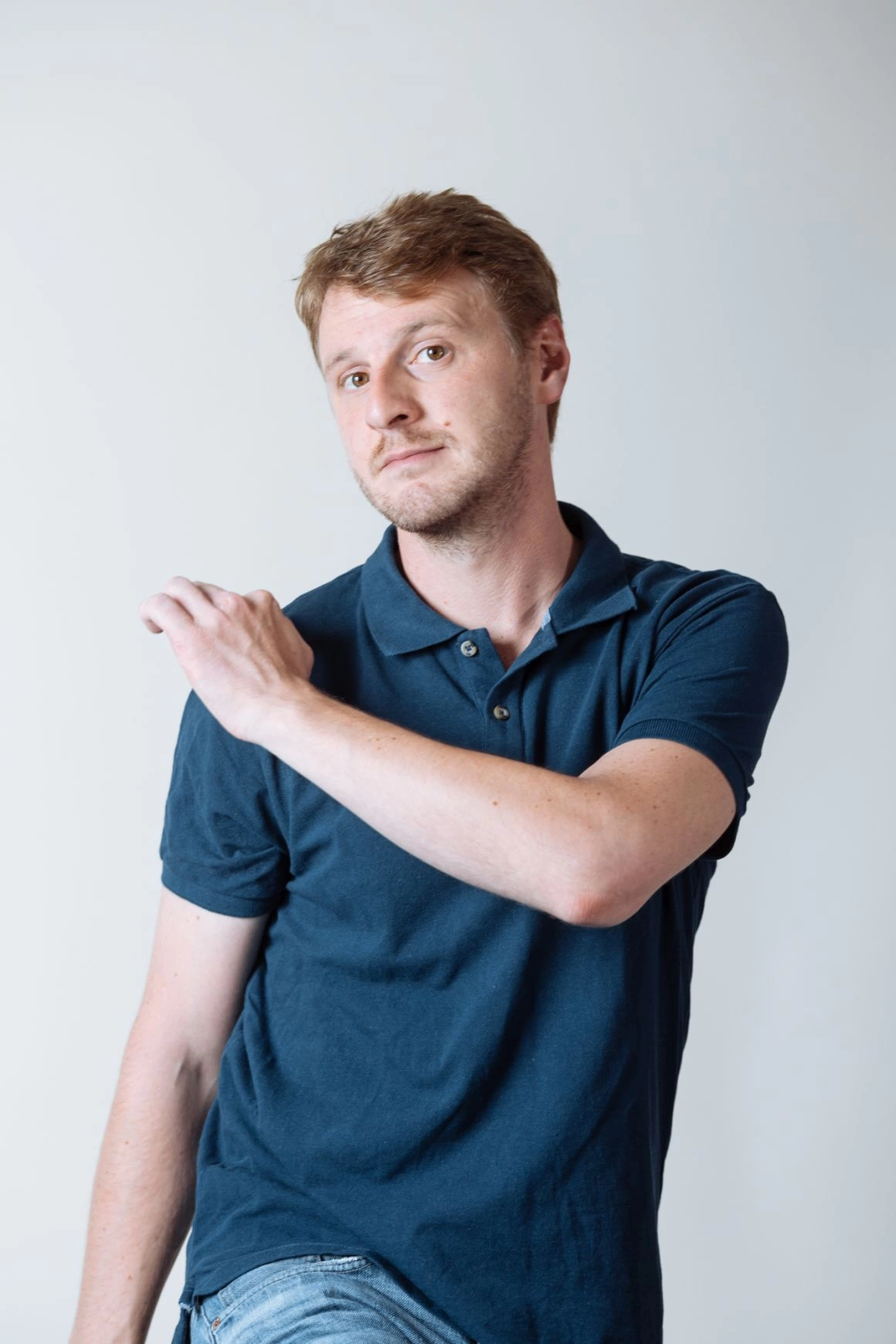
“You don’t find higher grounds up there in the sky, you find it right here, among ourselves”
He started college in 2003 and it was there that he found another environment he resonated with and that molded his identity. Through David Schwartz, who was a Directing student at the time, he fell in love with Brecht. Later, Schwartz asked for his help with an exam and act in Man Equals Man. What fascinated him about the German playwright was the desacralization of the theater, the brake-away from conventions, and the social themes that that were all built around a spectacular and implicit performance. “Until Brecht, the emphasis was on creating illusions, on an aberrant idealist philosophy, without any materialistic core. That’s what happened to Marx, when he introduced materialism. People reacted poorly, Get the hell away with that, we’re aspiring to higher grounds. No man, you don’t find higher grounds up there in the sky, you find it right here, among ourselves. And we must aspire to work towards access to resources for all people, without any discrimination. It’s just not fair for three people to have monopoly over everything.”
His Directing colleagues, such as David Schwartz, Ioana Păun, Bogdan Georgescu, and Vera Ion, were doing completely different things from what Poto was at Casandra Theater. This opened his eyes towards something different, towards things he didn’t wholly understand at first, because he didn’t know their context, such as the status of woman, LGBT culture, drug culture, evacuations, consumerism, etc… “What they were doing was something much more profound that what could be seen at the surface. They were giving you a real stake. I loved the idea of getting involved in society through my work. That is very important to me. Others just have their own interests at stake, but no me”.
College taught him to be disciplined and always present in the reality that surrounds him. He started to be attracted to themes such as: poverty, war, hypocrisy, ignorance, fanaticism, money, identity, and sexuality. He believes that all of these themes need to be well-synthetized, so that they would plant the seed inside the viewers’ minds and they would start contemplating things. “I always look for the utility in everything I do. I believe that theater is a learning tool, not entertainment. It raises some issues, so that people who come see the plays start contemplating them. It makes people wonder, it doesn’t have an executive power. If out of 100 people who come to see a show, there is one person who is curious about things and does a Google search when they get home, I think that’s a success”.
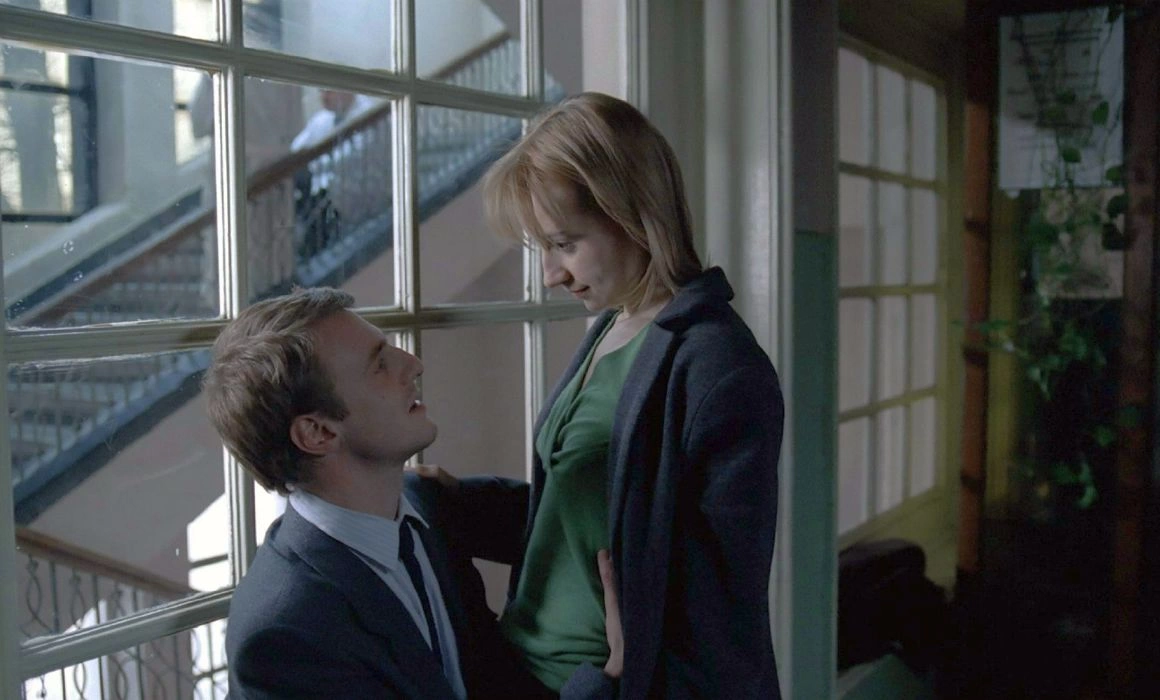
“You can’t just fool around, you must take yourself seriously”
Poto started working in the industry when he was still a student. At first, he did movies, then commercials. He found out from his colleagues that he needed to make a casting sheet, so he did one and started sending it to various agencies. Before he got any work in ads, Cristi Puiu came to his school. “He gave us some stuff to read, whatever he needed for his movie, nothing big. I read a few lines, and I ended up in a movie”. Poto’s big-screen debut was in the movie Moartea Domnului Lăzărescu (The Death of Mr. Lăzărescu) (2005) where he was a stretcher-bearer. Then, his casting sheet started paying off and he played an “intercommunication specialist on an armored intervention car” in the movie Hârtia va fi albastră (The Paper Will Be Blue) (2006), by Radu Muntean. After a limited audience screening in a cinema mall, Cristian Mungiu approached Poto during the after-party and called him for an audition for 4, 3, 2 (2007). He ended up doing that movie, followed by numerous Romanian and foreign movies. “They just kept coming. I was making money, I could make a living”. In 11 years, he did nearly 30 of them, short and feature length movies, and twice as less plays.
He finished college in 2007, and until 2008 he had done four shows: Monged, directed by Vera Ion, Zdrențe (Rags), directed by David Schwartz, Regele Moare (Exit the King), directed by Mariana Cămărăşan, and Ferdinand al VIII-lea Regele Spaniei (Ferdinand VIII, King of Spain), directed by Iarina Demian. Between the years 2008 and 2010, he did zero plays, he focused only on movies and commercials. Then came, Capete înfierbântate. 13-15 iunie 1990 (Hot Heads) in 2010, by David Schwartz și Mihaela Michailov, a play about the 1990 Mineriad. The story is told through the voices of seven direct participants, all played by Alexandru Potocean. For Poto, Hot Heads represents the landmark of his career, considering how he started to relate to theater when he started college and how he was fascinated by Barrymore when he was a child. “You have one actor, who in one hour and 45 minutes, plays seven different characters. Actors are praying for these types of roles, roles that highlight their abilities and their talent.”
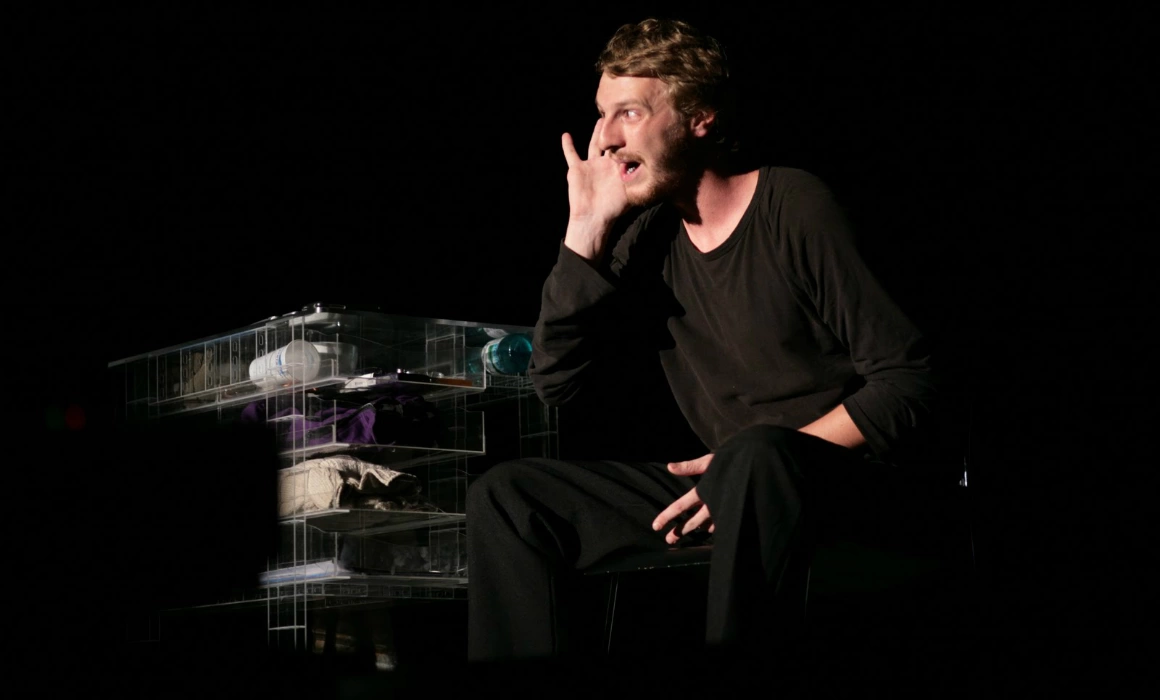
Poto is simply killing it in Hot Heads. You can see him transform on stage in Doru Mărieș, Marian Munteanu, Miron Cozma and Ion Iliescu. And he is terrifying as each one of them. He stops you in your tracks, takes you with him, you’re paying attention. He’s the center of attention and he’s got a job to do, a job with a very real stake: “I felt a bit that I was offering redemption to the blue-collar worker. My grandfather from Petrila was a miner, but he wasn’t in the Mineriad.” Alexandry only had three weeks to build those seven, oh-so varied roles. Each one had a lengthy 10-minute monologue.
“You can’t just fool around, you must take yourself seriously. You must believe in your discourse. I’ve seen clips with the real characters from the research done by Schwartz, Michailov and Cinty Ionescu. I would watch them all day long. When I would come to rehearsals, I would mumble to myself on the streets. People would look at me as if I were insane. I would go over my lines even before I went to bed. There were a lot of lines. Iliescu and Marian Munteanu’s lines were filled with red herrings and they were horrible to memorize. They would say something and it was a complete nonsense. I had a rough time learning them. And when I came to learning Cozma, I would just start laughing. You just can’t take that man seriously.”
Hot Heads gave Poto a huge boost of confidence in everything he ever did after in theater. Things felt easier to him, even though they weren’t actually easier. It was by far, one of the toughest shows he’s ever been in. But the social-themed shows he came after were just as tough: Subpământ (Underground) directed by David Schwartz, Tipografic. Majuscul (Typographic. Capital Letters) directed by Gianina Cărbunariu, De vânzare (For Sale) directed by Gianina Cărbunariu, Ce-am fi dac-am ști (What We Could Be If We Knew) directed by David Schwartz etc.
“The shows are difficult and they raise important, concrete and very contemporary issues. You need to be very careful when you’re delivering those messages. These shows can be easily misunderstood by the audience if you’re not giving them some proper attention. If you just let the chips fall where they may, you might not get it right, you might create something mundane. You need to believe in the shows and if you’re not passionate about what you’re doing, you simply can’t do it.”
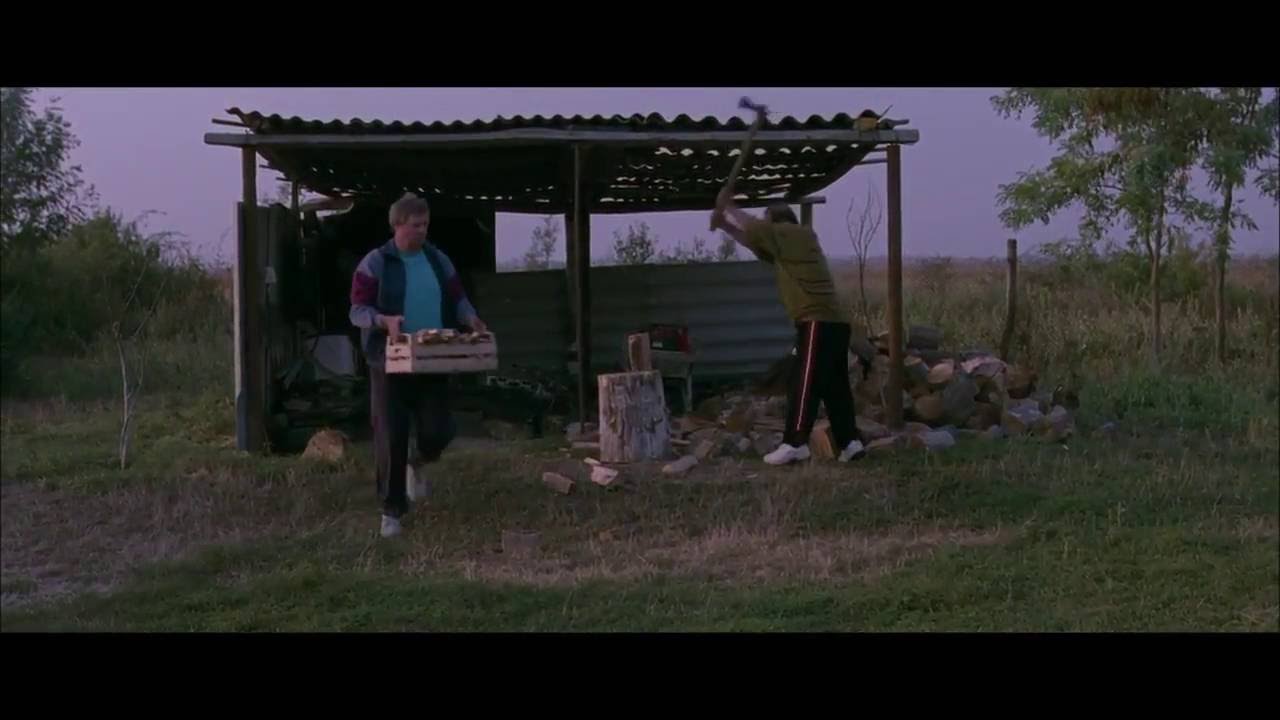
When it comes to movies, they’ve all seemed quite demanding to him. The vast majority of them were filmed at night, when the human body is known to do something else. Sometimes it was cold, raining or snowing. Rehearsals were scarce and you would do everything as you went along. This forces you to be as real as you can, it teaches you things you didn’t even think you would learn. While researching for his roles, he learnt what it meant to work on an ambulance in 03. Bypass (2016), how to skin a rabbit “so that you don’t break parts of its insides, otherwise everything gets filled with crap” in The Way Back (2010) or the difference between an automatic and a non-automatic gun in Portretul luptătorului la tinerețe (Portrait of the Fighter as a Young Man) (2010). I had short lines, such as sorry and eh, that I needed to make meaningful. “Everything is focused on intentionality, and less on words”.
“New Wave movies, and there are a lot of these, always have short and concise lines, you rarely get to speak in longer sentences. You have to be a blank sheet, to talk meekly, your reactions, your looks and your grimaces need to be toned down to a minimum, to be almost inexistent. And this is contrary to what I’ve seen in real life. People make faces, they scratch their asses. It’s called economy of means, where you need to strip down the issues of the character and eliminate your own superfluous character, as much as possible. In theater, things are much more expansive. ”
Poto says it took him a long time to earn his freedom on set and he believes that the turning point was Bogdan Mirică’s Bora-Bora (2011), where he had the chance to express himself and became braver. “There are a lot of movies where I was wooden and I had no idea what I was doing; it felt like I was reading from a book. Look at me in Moartea domnului Lăzărescu, Hârtia va fi albastră, 4, 3, 2, and Nuntă mută. It looks as if I’m radio-controlled, I was stiff. I was doing the things I was being told to and I didn’t get to think for myself. And maybe the most important thing that helped developed his movie skills was the work he did with the students from Directing. He always makes time to help them out when they ask for him. ”
“It’s a training that no actor should oversee. If there’s anything that helps you master the art, it is working with these people. They don’t know what they’re doing, but they’re doing it, and you don’t know exactly what you’re doing, but you’re learning from each other. This is a great training. We’ve been to hell and back together, we’ve ever been quarantined during the bird flu outbreak. ”
Here, Poto tells a story from his first movie that he did in college. It was for an exam of one of his colleagues for Directing, Barna Nemehti.
“You make your own security, you hustle”
Alex is the type of actor who does his research, who immerses himself in the context, except for when he does movies, where things are more “slapdash”. His trusty informers are YouTube, books, and articles. When he is rehearsing, he doesn’t stay out late for drinks and he’s always early, and does vocal prepping, his jaw unclenching, which tend to act up when he’s nervous. And he learns his lines well, which is basically the secret to it all. This isn’t done by reading the text when you’re sitting down. When you’re reading it, you’re starting to understand it, but it is during rehearsals when you’re really memorizing it. When you’re with your colleagues and you’re constantly seeing you lines and making connections. “Lots of elements from a show can help you, you know that when a colleague of yours is in one place, you need to say that line and it just becomes a reflex. Sure, sometimes it happens to just forget, to be completely blank, but you need to know what you’re saying, so that you can replace the words. It needs to become very personal, to be as if you’re the one who uttered those words in the first place. You need to make an effort to make the text your own.”
He’s always been professional in everything he’s ever done. Even when he was carrying a tray as an extract at the Comedy Theater. Or when he was doing a cliché beer commercial. Or when he was running like a madman carrying a gun to shoot a CGI snake to revenge his brother in Anaconda 4 (2009). “At the beginning I said yes to everything that came across. You need to be seen, you need to make a name for yourself, to pay your rent. Little by little, people start noticing you, and when something good comes along, you need to take it seriously. I’ve started to say no to roles, lately, ever since I’ve been more aware of what’s going on around me. But when I was in college, I would never say no.”
Commercials pay his bills and his vacations. He’s not ashamed to do them and treats them like any other roles. “I think it’s hypocritical to say that you don’t want to waste your talent. I mean, you can’t just escape the system altogether.” With the money he earns from commercials, he can relax for a while and make a play with David Schwartz, for less money. He’s tried to be more open and more understanding of the people he’s worked with, regardless of the nature of the job and even if he didn’t get paid on time. “If I were to sue people for these types of things, I would spend all day in courts. This is what I do for a living. I’m waiting to get paid, there’s nothing I can do differently. I try not to offend people, and even when I’m right, I don’t like to argue with people.”

This attitude has helped him support himself while doing independent theater, a field that is constantly dominated by insecurity. He didn’t want to get a job and have a monthly paycheck, even though he could have done that. He likes moving from one place to another, to explore and not to be tied down “by the absolute monarchy of a director”. He likes the projects where he is allowed to think freely, to understand things on his own terms, to come up with ideas and to put his own mark on it. “You make your own security, you hustle. I have some colleagues who have grown tired of hustling, they’re struggling and they’re acting in crap productions. When you’re hired by a theater company, you are told what to play and what to say. The actor is not a puppet who sings what you tell it to sing; they’re not a jukebox. All the projects I did in the independent scene have been beneficial for me. I’ve advanced intellectually and my resources as an actor have grown. I was allowed to travel the country and outside of it. There are theater companies that don’t even go touring in Ploiești! ”
Poto remember one single rough period, a few years ago, when he spent all his money in Control club. But it was because he didn’t take into account the months when the acting jobs are drying up, January to March. “I was in no man’s land, but then it all came through. In times like those you can lose your focus, but I said to myself that I would wait. What could go wrong? Something will show up”. He started making movies when he was a sophomore in college. He always found a job, and never really did have any stretches of time where he didn’t work. He reached his financial peak with the American production The Way Back (2010), a movie about a group of prisoners who escape from a Gulag camp during World War II. With the money he made from that movie and some help from his father, he bought an apartment in Bucharest. A sweet pad in Pantelimon, where he once cooked rooster soup for me in a cuctă, a word Transylvanians use for the pressure cooker and where we drank pălincă and watched Queen clips on YouTube.
Lately, he’s been searching for some balance in his private life, so that he doesn’t lose his concentration. He’s got a job that requires lots of sleepless and demanding nights, so he knew that he needed a long-term relationship. His partner of two years is Andra, who is training to be a doctor. “I need the stability that helps me be myself. Countless women and non-stop drinking haven’t really helped me. This whole bohemian artist shtick is crap. You need to be there, well-slept and well-eaten. You can’t come drunk from Control and get up on the stage. After rehearsals, you go home, do some more research, to better understand the role and only then can you do some stuff for yourself, because you have a life. But the role never leaves you. You just need to shift your attention, you need to be focused on your job and also your partner, to grab a drink with them, from time to time. ”
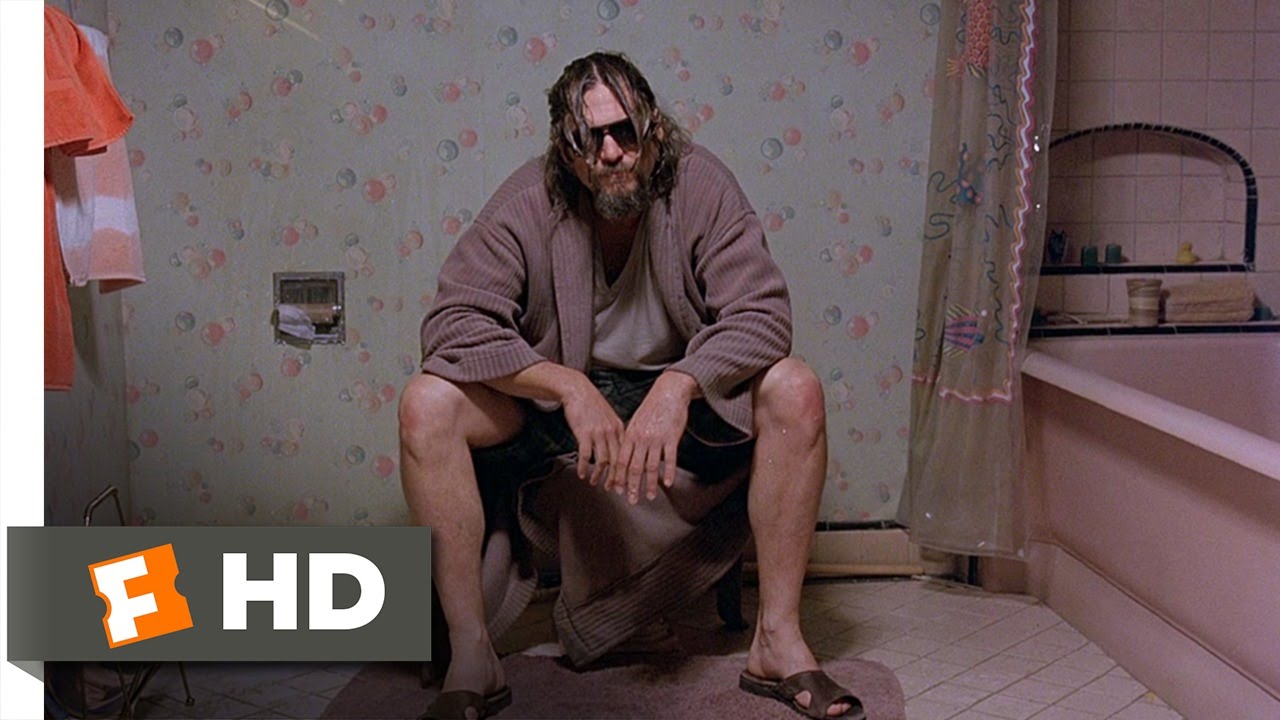
“I have an issue with the outrageous concept of me, me, me, me”
When he’s not an actor and he’s not grabbing a drink with his partner, Poto reads. Now he’s reading Jaques Fresco’s Designing the Future. He’s into sociology, anthropology and left wing politics, which he thinks is more human and less competitive. “I don’t believe that life is a competition. The world we live in was stupidly created to mold fighters, where winning is the central idea.” When he’s not reading or contemplating life, and he feels the need to do something, he plays non-competitive games. Games that don’t require you to build tribes and armies and kill people with a gun. I would rather transport wood in a truck from Nuremberg to London in Euro Truck Simulator and obey traffic rules, get tickets, fill up at a gas station and rest on the road. “I’ve also been playing Airport Ops on the tablet, where you are in charge of everything at an airport. I like to play with myself, I’m a bit of a wanker, but it’s alright”.
Other than that, Poto watches movies on Mubi, a niche movie-streaming website. He’s quite annoyed with the wannabe artsy films. “Dude, do you have something to say? A movie should be simple and concise. I don’t watch movies for the art of it, but for the theme and the way it communicates what it needs to communicate”. He doesn’t like going to the theater, because he’s tired of seeing the same, old things – “Let that damn Shakespeare rest, already!” and also because he’s got a tendency to say: “If only I were be in charge… ”, but he made a pact with himself that come fall, he will see all the plays in Bucharest. “So that I can make a genuine and comprehensive idea of what’s going on in this city and how I place myself in that scene. I realized that this is something I needed to do, because it’s the only thing I know how to do. I only know the play that I build myself, and I don’t know what’s going on in the bigger picture. I think it’s because of my job.”
He loves to travel and he would love to do that on his bike, which he’s currently only using it to get from point A to point B. A while ago, he used to take his bike and go outside of Bucharest and in the future he’d love to bike through Valea Jiului. He’s also not going out that much anymore, he’s no longer driven to do that. “It’s the age. I’m trying to build a private live, a full live. We’re even thinking of having kids, I’m thinking about what direction to go with my job, so that it can sustain a family. To me, family is very important and it requires a great amount of involvement. I believe that family is what makes you grow as an individual on this planet. It makes you more aware and less selfish. I am quite a selfish person, due to the nature of my job, even though my message itself is selfless. It’s nice to have people like you, but this also feeds that ego. I’m also a bit selfish due to the fact that I was an only child, even though I wasn’t spoiled or anything, but my parents focused all their attention on me. I have an issue with the outrageous concept of me, me, me, me”.
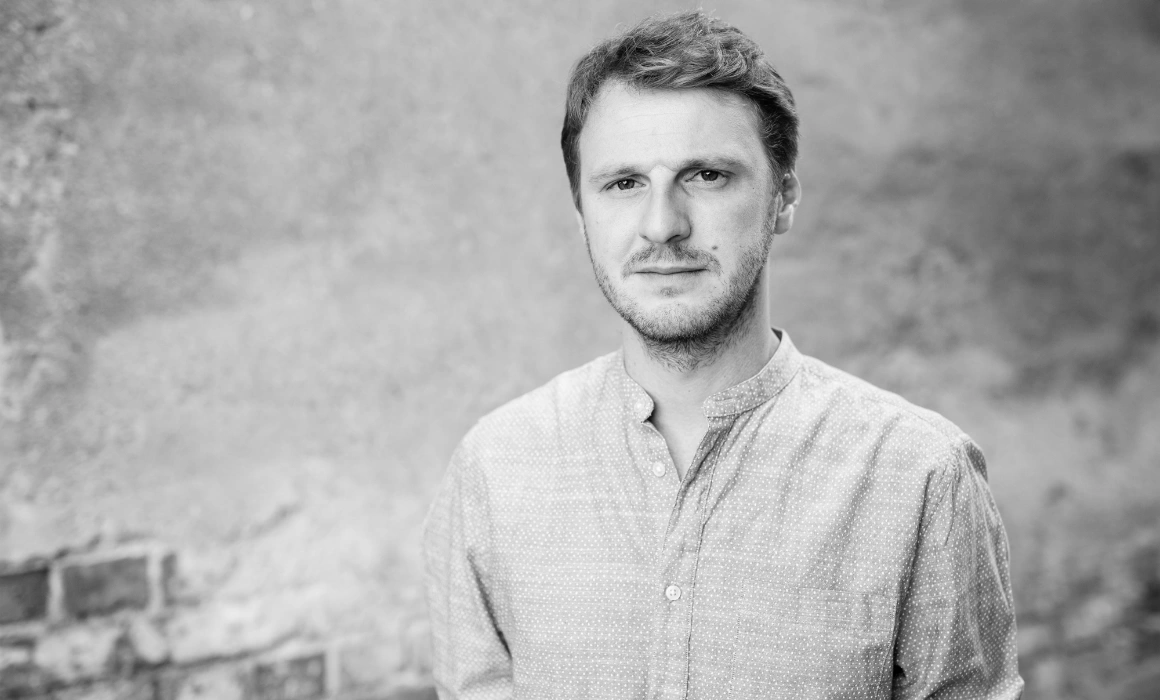
Poto says that he never wanted to be a star. Even though it feels nice to be recognized on the street, he’s not desperate for it. He knows that you’re a bad actor when you think you’re cool and you’re a good actor when you do the job you’re hired to do: you learn your lines, you’re on time, you’re professional, you pay attention to the discussion, you think things through and you do your best. “I don’t want to be a star, I want to be present in a reality that is constantly changing, and I want to understand the present. I’m looking to grow, to be informed, to meet people who can teach me things. Stars come and go. There is a certain dose of narcissism in art, you need to love what you’re doing, but there are always limits. There was once a light guy in Casandra, Florel was his name. He saw me coming to rehearsals on my bike; he was smoking, he looked at me and said: “Mister Potocean, you need to understand that now that you’re at Casandra, you’re someone important. In the old days, actors would travel by carriage or by car”.
In the future, he would like to branch out and do more foreign films. He’s already been working on updating his portfolio. Poto will continue to make both film and theatre. He loves the production process and the live part of the theater, but he also loves the film’s spontaneity and creativity, a field that “gets you more visibility and more money”. In September, we’ll be seeing him at Odeon in Guillem Clua’s Promised Land, directed by Bobi Pricop – a play about global warming. He’s also doing two more plays in 2016, by Gianina Cărbunariu și Radu Iacoban. As for movies, he’s only got one collaboration in store for this year, the short film Anathem, written and directed by Andreea Borțun, where he will be playing a shepherd.
“I have the privilege of doing something I like, something I’m attracted to and I can’t just let the chips fall where they may.” Acting was something that validated him after a long period of time when he didn’t feel validated and throughout a time that he didn’t even think he would make it to high school. It is something that he believes he can use to change the world around him for the better. “I would be very sad if I couldn’t do this thing anymore”.
* The first man who called him “Poto” was his colleague, Stănoaia Alin. This was in the first grade.
Translated from the Romanian by Cristina Costea




